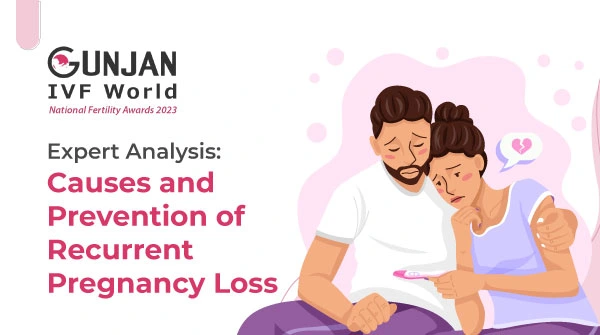20+ Years Of Experience as Fertility Specialists
20 Years Of Experience as a Fertility Specialists
National Fertility Awards 2023
Call Us
+919990044555
Becoming pregnant and starting a family is one of the most joyous and exciting moments in a couple’s life. However, in some cases, couples may experience recurrent pregnancy loss (RPL) – the loss of two or more pregnancies before the twentieth week.
This can be devastating, and it’s essential to identify the causes and seek proper treatment to prevent future losses. In this article, we’ll explore the causes and prevention of recurrent pregnancy loss and explain how Gunjan IVF World can help you.
If You Want to Know More Details – Find Out Which Month is the Perfect Time for IVF in India
-
Understanding Recurrent Pregnancy Loss (RPL)
RPL is commonly defined as losing two or more pregnancies before the twentieth week. The risk of RPL increases with age, with women over 35 being at a higher risk. There are multiple potential causes of RPL, including:
Chromosomal Abnormalities
Chromosomal abnormalities are one of the most common causes of RPL. About 50% of all miscarriages occur because of chromosomal issues. These abnormalities typically occur during cell division, leading to an improper number of chromosomes in the embryo.
Book An Appointment
Follow Us On
-
Prevention of Recurrent Pregnancy Loss
Preventing RPL requires identifying and addressing any underlying medical factors contributing to miscarriage. Here are some of the most effective ways to prevent RPL:
Manage Chronic Medical Conditions
If you have any underlying medical conditions like diabetes or thyroid disease, it’s important to keep them well-managed before and during pregnancy. This can help reduce the risk of miscarriage and promote a healthy pregnancy.
Address Hormonal Imbalances
If hormonal imbalances contribute to RPL, medication or lifestyle changes can help manage these issues. For instance, managing insulin resistance through diet and exercise can help regulate hormonal imbalances related to PCOS.
Consider Genetic Counseling
If you have experienced multiple miscarriages, genetic counseling may be recommended. This can help identify any genetic abnormalities that may increase the risk of miscarriage and provide guidance for future pregnancies.
-
How Can Gunjan IVF World Help You?
At Gunjan IVF World, we understand how difficult and emotionally challenging it can be to experience recurrent pregnancy loss. Our team of experienced fertility specialists is dedicated to providing unparalleled and compassionate care tailored to each individual’s unique needs.
We offer various services, including genetic counseling, hormonal assessment, and advanced treatments to address underlying medical conditions. Our state-of-the-art facility has the latest technology and equipment to ensure our patients receive the highest quality of care possible.
if you want to know more details: 11 Tips To Choose A Fertility Specialist In Delhi?
Wrapping up
Recurrent pregnancy loss is a challenging experience for couples looking to start a family. Identifying the causes and seeking proper treatment can increase the chances of a successful pregnancy in the future.
At Gunjan IVF World, we are here to help you every step of the way, providing innovative treatments, compassionate care and hope for your future.
If you’re experiencing recurrent pregnancy loss, contact our team of experts today to schedule a consultation. We are committed to helping you achieve your dream of starting or growing your family.
Share this with
Related Videos
What is TORCH test in infertility and why is it done?
There are numerous tests that are available to infertile couples that are recommended by some doctors, which might help them determine the cause of their infertility. One such test is the TORCH test.
What is Prolactin Hormone?
Prolactin is a hormone produced by the pituitary gland present at the brain’s base. It is best known for its role in lactation, or milk production, in breastfeeding women.However, Prolactin also plays other important roles in both men and women, such as regulating the immune system, stimulating the growth of new blood vessels, and influencing behaviour and reproductive function. In this blog, we will explore what Prolactin is, how it works, and what happens when there are imbalances in prolactin levels.
Follow Us On
About Author






